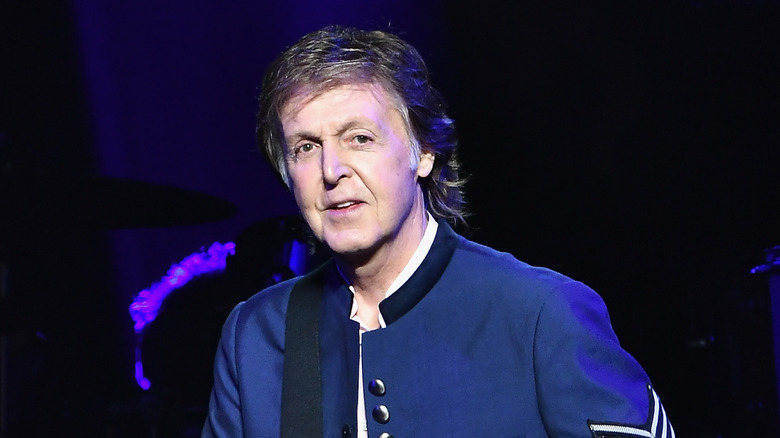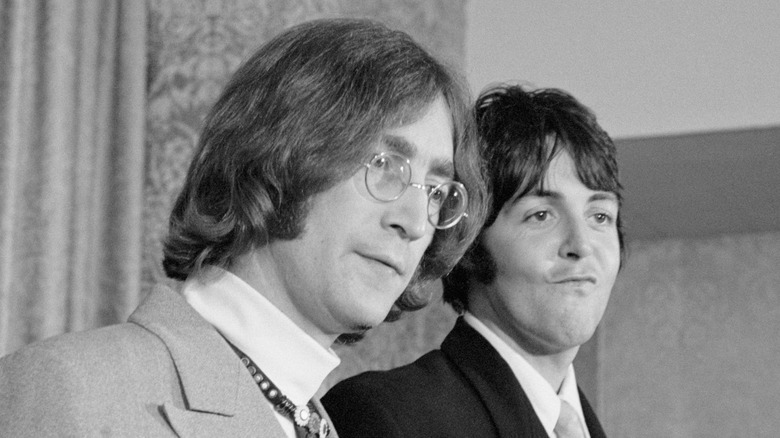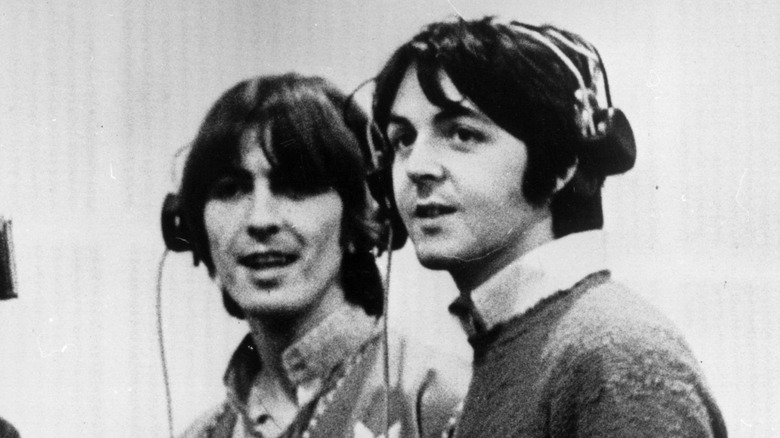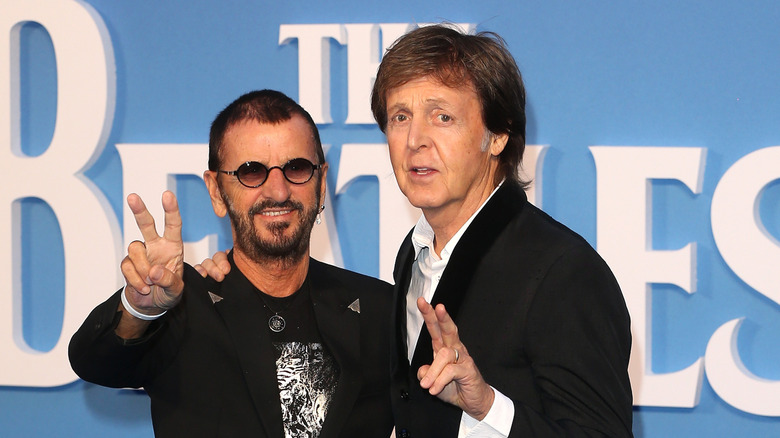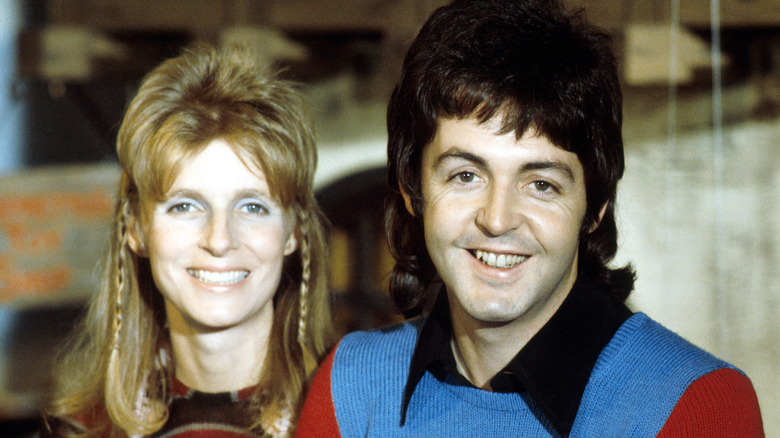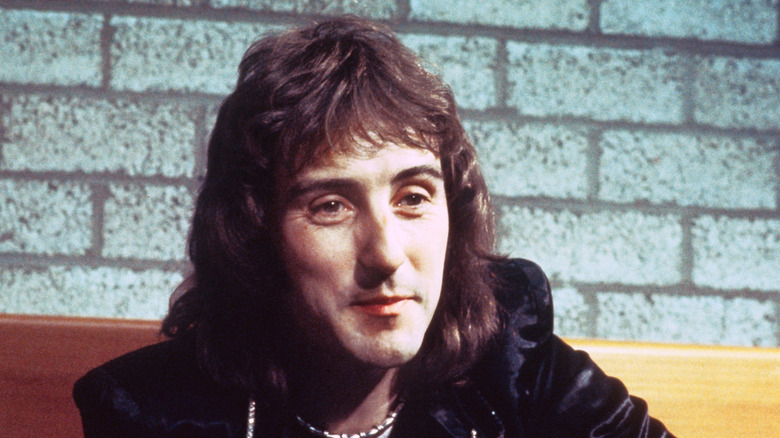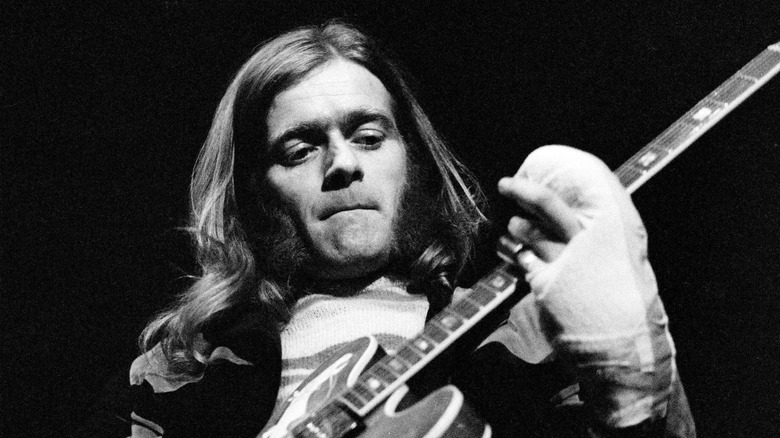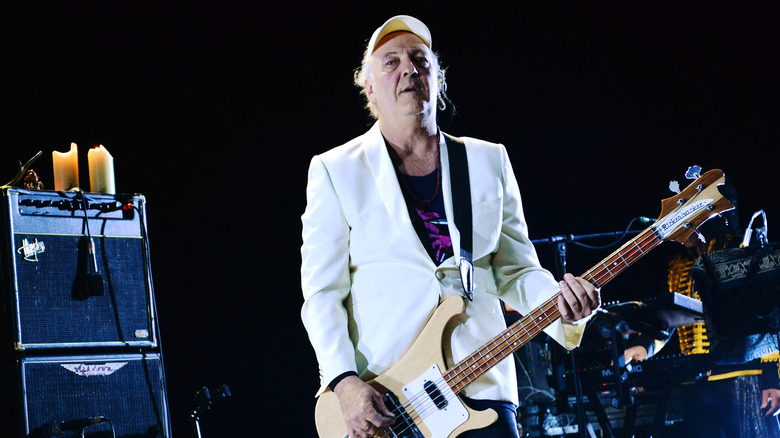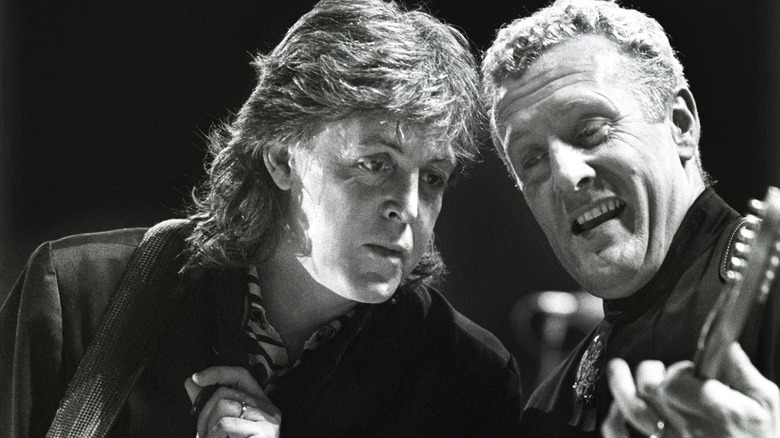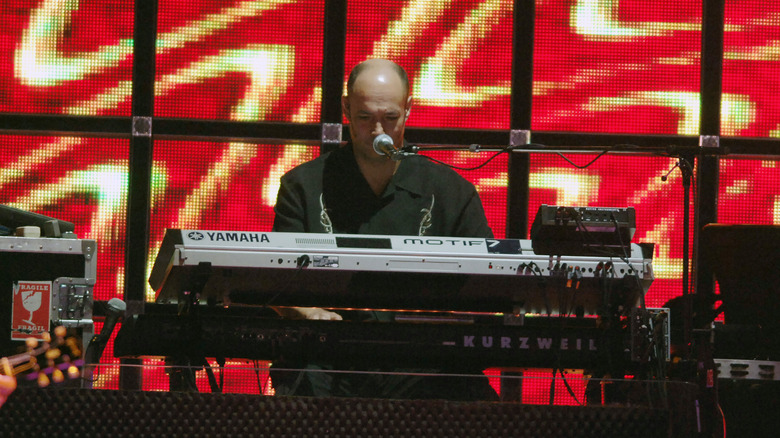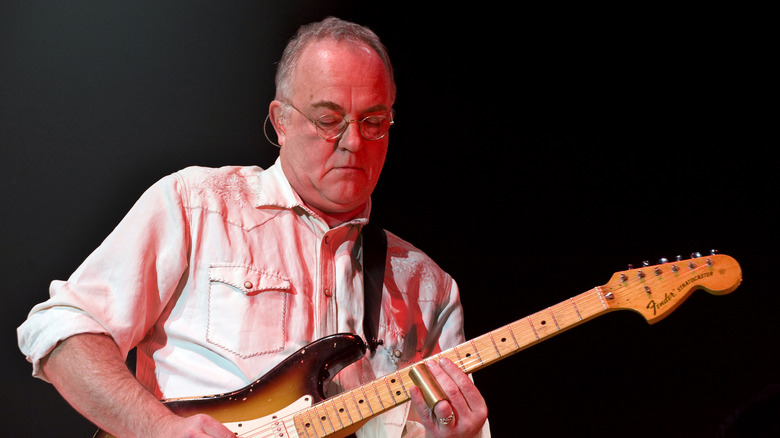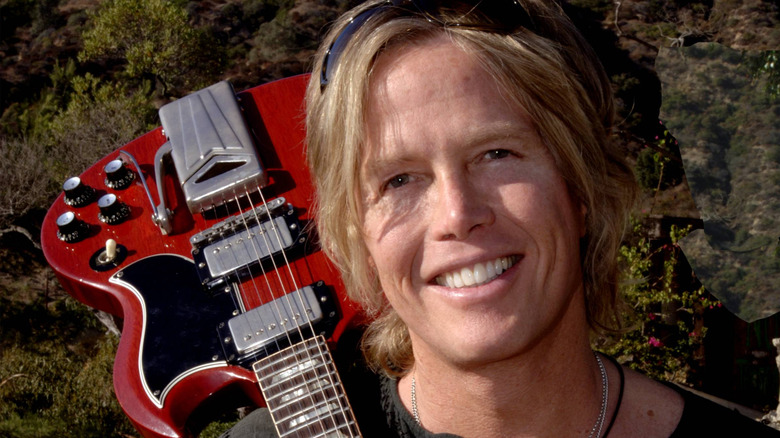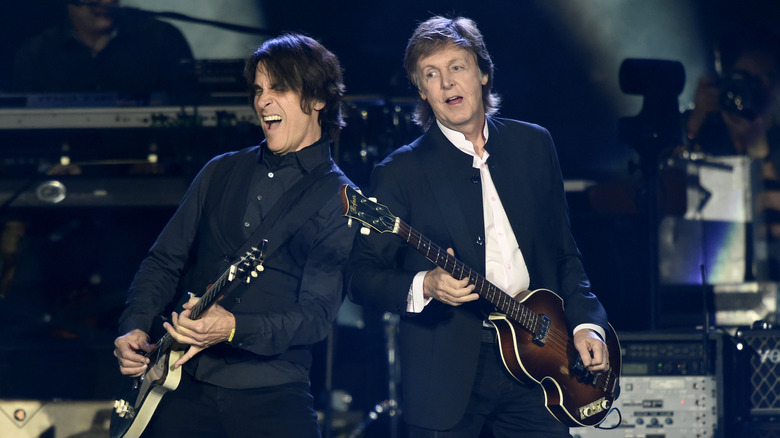Paul McCartney's Former Bandmates Have A Lot To Say About Him
At the top of the pantheon of rock stars stands Paul McCartney, whose songs have provided the soundtrack to our lives for six decades and counting. From his songwriting partnership with John Lennon in The Beatles to his 1970s incarnation as the leader of Wings, followed by his ongoing success as a solo artist, McCartney is arguably among music's all-time great songwriters.
He's also pulled off the rare trick of remaining both famous and relevant as an elder. That was evident when the 82-year-old took to the stage of Studio 8H in Rockefeller Center during the 2025 special celebrating the 50th anniversary of "Saturday Night Live." Closing the show, McCartney brought down the house with a fiery performance of a medley of The Beatles' "Abbey Road," demonstrating that he could still rock out with the best of them.
Over the years, Sir Paul (he received a knighthood from Queen Elizabeth II in 1997) has performed with numerous musicians in various incarnations, and McCartney's former bandmates have a lot to say about him.
John Lennon
The truth about Paul McCartney's relationship with John Lennon is complicated. Lennon, in fact, had some major issues with McCartney, before and after the fractious breakup of The Beatles. That was evident in Lennon's vicious diss track, "How Do You Sleep?" in which Lennon blasts his former bandmate with such verses as "Those freaks was right when they said you was dead," and "The sound you make is muzak to my ears." That circled back to a 1970 interview with Rolling Stone, when he slammed McCartney's debut solo album. "I thought Paul's was rubbish," he said dismissively.
Of course, fans will also recall that their relationship improved in the years that followed. In his final interview with Playboy (via Beatles Interviews), published shortly after Lennon's tragic 1980 murder, Lennon revealed that he and McCartney had mended fences and would see each other whenever McCartney dropped into New York City.
Lennon also dropped a minor bombshell. In April 1976, Lorne Michaels made a hilarious on-air offer of a whopping $3,000 for the Beatles to join him on "Saturday Night Live," and Lennon and McCartney nearly took him up on it — just the two of them — a week later. "We were watching it and almost went down to the studio, just as a gag," Lennon said. "We nearly got into a cab, but we were actually too tired."
George Harrison
Like John Lennon, George Harrison had a somewhat contentious relationship with Paul McCartney. That was on display in the Beatles documentary "Let It Be," during a now-notorious exchange when Harrison sarcastically responded to McCartney's attempt to show him how to play a guitar part.
"I had no confidence in myself as a guitar player, having spent so many years with Paul McCartney, because he ruined me as a guitar player," Harrison said in a 1974 interview with Allan Freeman. While Harrison chose not to elaborate, he pointed to a statement made by Henry McCullough, who'd played guitar for McCartney's post-Beatles band, Wings, before quitting. "Because I remember reading something that Henry said that he left Wings ... because he said, 'I don't know if I'm good or I'm bad, I can play this or I can't play anything,'" Harrison said. He also pointed out that guitarist Eric Clapton had "treated me like a human" — presumably a marked difference from his experiences with McCartney. He did, however, remark that he was preparing to bury the hatchet with McCartney, "because we drifted off away from each other" after the dissolution of The Beatles. "I just know that, you know, whatever we've been through, there's always been something that's tied us together," he added.
Meanwhile, Harrison pulled no punches when he shared his opinion on McCartney's musical output during the late 1970s. "I think it's inoffensive," Harrison dismissively told Rolling Stone in 1979.
Ringo Starr
As the only two members of The Beatles to make it to their 80s, the truth about Paul McCartney's relationship with Ringo Starr has been well documented. Both, in fact, have long since put the bitterness of the band's breakup behind them. Reflecting on his eight-year ride with the band during an interview with AARP, Starr credited McCartney's work ethic for the enduring success of The Beatles. "Paul loved to work more than all of us," he said, recalling how he and John would be hanging out, doing nothing, when they'd receive a call from McCartney urging them to join him in the studio. "I've always thanked him for being that guy, because otherwise we'd have put, like, three albums out and vanished."
While appearing on "Jimmy Kimmel Live!" Starr offered McCartney even higher praise. "I am always captivated by Paul's genius," he declared. Adding to what Starr's former bandmates have to say about him, the drummer showed off a postcard that McCartney sent him, the day after The Beatles' famed rooftop concert that was chronicled in the "Let It Be" documentary, reading, "You are the greatest drummer in the world. Really." Said Starr of McCartney, "He's a beautiful guy."
Starr also admitted that, after all the decades that had passed, he still enjoys making music with his former bandmate. "If he comes to LA we certainly do something, and when I get to England we'll do something there," Starr told USA Today in 2024. "It's just what we do."
Linda McCartney
Linda McCartney played a singularly unique role in Paul McCartney's life, being both his wife and a member of Wings. That, she said in an interview for Diamond Hard Music Entertainment (via The Paul McCartney Project), provided some challenges. "Being on tour, which I enjoy because I love the band, is not something I would do by choice in my own life," she said. "The bulls*** and the showbiz in this sort of life gets on my nerves."
During that interview, she also weighed in on her husband's creativity. "Paul has an artistic side that isn't level-headed, and I like that," she said, praising the values he was taught by his family, which had kept him down to earth despite being one of the world's biggest stars. "His mind is amazing. Although his roots are earthy, he's up in the sky on other things," she added, explaining how they continued to influence each other. She also observed that her husband, like most men she'd met, could also be a bit of a baby. "Men need mothering, sometimes I just want to say, 'Get on with it, kid,'" she added.
While the couple enjoyed a long and loving marriage until her tragic death from breast cancer in 1996, she maintained a somewhat pragmatic view of marriage. "If Paul were to go, okay, I'd move on to something else," she said in a 1992 interview with Vanity Fair (via The Paul McCartney Project). "Hey, even at my old age, I'd still be able to have some fun."
Denny Laine
Prior to joining Paul McCartney's Wings, Denny Laine was best known as a founding member of The Moody Blues, singing and playing guitar on the band's early hit "Go Now." Laine, who died in 2023, began working with McCartney in the early 1970s, and remained with Wings for a decade.
In a now-infamous 1984 interview with The Sun, Laine bitterly complained about McCartney, serving up all manner of accusations. For example, Laine claimed that McCartney and wife Linda were potheads who smoked two ounces of weed per day. "Once Paul and Linda were so desperate for cannabis that they even smuggled the drug through customs in the hood of their baby son James' coat," he said, also accusing McCartney of being a fabulously wealthy cheapskate who underpaid him and didn't give him songwriting credit for his contributions to songs.
In a 2017 interview with Billboard, Laine also dismissed the notion that Wings was an actual band in the traditional sense, insisting he and his bandmates were merely McCartney's backing group. When asked by The Austin Chronicle if Wings deserved a spot in the Rock and Roll Hall of Fame, he responded, "No, because Wings was never a band. I'm sorry, it wasn't. It was a Paul McCartney project. You have to know that ... It was Paul's band. That's the end of it."
Henry McCullough
Guitarist Henry McCullough was one of the first people Paul McCartney contacted when putting together Wings. Initially, McCartney and his new band played small, surprise gigs at universities — with McCartney and the rest of the band splitting the proceeds equally. The camaraderie established during that tour, however, soon eroded. As McCullough said in a 1997 interview with Mojo (via The Paul McCartney Project), McCartney had originally assured him that he and the others could contribute material — and thus share in the lucrative songwriting royalties — but McCartney's controlling nature soon took over. McCullough recalled imploring McCartney to let him try something while recording a song, insisting that if it didn't work out then they could do it McCartney's way. McCartney dismissed him entirely, sparking a fight that led McCullough to quit. "But I think we both knew in our hearts it was time for me to go and he left it to me to choose the time of leaving," he said.
Ultimately, McCullough — who died in 2016 — insisted there were no hard feelings, revealing that McCartney phoned him up a few months later and invited him into his studio. "And he gives me a huge check and a flight case full of guitar strings!" he recalled. Despite their differences, the guitarist praised McCartney as "a gentleman," as well as "a brilliant businessman, a brilliant musician, and a bloody great man too."
Youth
Paul McCartney has been involved in a variety of eclectic musical projects over the years, ranging from composing a classical piece, "Liverpool Oratorio," to teaming up with musician and producer Youth (aka Martin Glover, best known for his work with Killing Joke) as electro-pop duo the Fireman. That latter project came about, Youth told Sound on Sound, when McCartney became interested in his work and approached him about doing some recording together.
Thrilled with the opportunity to work with a legend, he eagerly agreed. After producing a few experimental tracks, Youth figured that would be the end of it. "But then Paul came back and said, 'We love these mixes so much I wanna put them all out as an album.' I was like, 'Who am I to disagree with this man?'" he recalled.
In preparation of entering the studio with McCartney, Youth produced various loops encompassing an array of genres, from delta blues to British folk music, wanting to surprise McCartney and push him out of his comfort zone. According to Youth, he felt that the somewhat aimless jamming they did was freeing for the former Beatle. "I was still just getting to know Paul, and I thought if I pushed him to write songs, we'd be in a situation of pressure and stress for him — which is one of the reasons he liked doing the Fireman, there wasn't any pressure or record‑company expectation," he explained. "He could just really let go and have fun."
Hamish Stuart
Glasgow native Hamish Stuart came to fame as a member of The Average White Band before Paul McCartney invited him to join his touring band in 1988. He remained with McCartney for the next six years, playing guitar while also handling bass duties when McCartney played another instrument.
When McCartney hit the road the following year, that tour marked the first time he began playing his Beatles songs in concert. While it would be easy to assume that McCartney would have to teach Stuart how to play the Beatles songs that he'd written, it was actually the other way around. "Many of the songs we played were done after The Beatles had stopped touring," Stuart explained in an interview with Penny Black Music, recalling how he wound up teaching McCartney how to play his own songs. "Some of us had played the songs live in our bands, but we had the records for reference. Clearly Paul knew the songs from writing them for the albums, but he had never played them live."
In addition to touring with McCartney, Stuart also played on McCartney's "Flowers in the Dirt" album, gaining firsthand knowledge of McCartney's mastery in the recording studio. "Paul's work ethic is really strong. He's a natural musician," Stuart told the Sunday Express, expressing his desire to work with McCartney again.
Wix Wickens
Keyboardist Paul "Wix" Wickens joined Paul McCartney's touring band in 1989; as of 2025, he remained that band's longest-serving member. Interviewed by Mu:zines, Wickens noted that, as a huge fan of The Beatles, performing on the iconic medley from the end of the "Abbey Road" album had become a career highlight for him. It was also his idea to convince McCartney to start playing it at concerts. "I knew it note for note and it was always my favourite section of the album. I used to sit there with the headphones on and imagine being on stage playing it!" he said.
Wickens was also well aware of what a complex piece of music that medley is, and before making that suggestion to McCartney, he and the rest of the band ensured they could absolutely nail it. "It was too good an idea to risk blowing it," he explained.
Meanwhile, Wickens also admitted he was surprised to learn that he wasn't just sharing the stage with a former Beatle, but also with a treasured piece of Beatles memorabilia: the Hofner bass that McCartney played in the Fab Four's early days and continued to use. "I was amazed he still played it," said Wickens of seeing the iconic instrument — which still has the band's final set list taped to its side — for the first time at a band rehearsal. "It's a piece of history and it's looked after very well, I can tell you!" he added.
Robbie McIntosh
Formerly guitarist with the Pretenders, Robbie McIntosh was recommended to Paul McCartney by that band's frontwoman, Chrissie Hynde. That led to an invitation to play on McCartney's 1988 "Flowers in the Dirt" album. McIntosh played guitar with McCartney's band from 1989 until 1994.
Playing alongside one of his musical idols for the first time in a recording studio was far from a casual experience. "It was terrifying at first, but then it was absolutely amazing. He was so nice," McIntosh told Rolling Stone. He recalled telling McCartney that he'd learned to play "Blackbird" when he was 12 or 13 years old, and when he played it for him, the former Beatle pointed out one bit that he'd been doing incorrectly. "He didn't go, 'That's wrong.' He went, 'Oh, I don't do it like that,'" McIntosh said.
While several of McCartney's former bandmates have pointed to McCartney's controlling nature, McIntosh insisted that wasn't anywhere close to his experience. "He gave us a lot of freedom. He was a great bandleader, Paul. He was never, 'Don't play that. I want you playing here,'" he said. "With me at least, he was never fussy about what I played." That said, McIntosh did reveal that McCartney was somewhat more dogmatic when it came to the bass lines guitarist Hamish Stuart played when subbing on the instrument for McCartney. "He's a really hard act to follow," McIntosh said of McCartney's prowess on the bass. "I wouldn't have liked to be in Hamish's shoes."
Brian Ray
Guitarist Brian Ray joined Paul McCartney's touring band in 2002, switching between guitar and bass. As Ray told Guitar World, a friend told him that McCartney was on the lookout for a musician adept at both instruments, and asked for his name to be put forward to McCartney. Soon after, he received a call, asking if he could travel to New Orleans the next day and play one song with McCartney at a gig that was far from low key. "Playing 'Freedom' at the Super Bowl was my audition," said Ray, who passed with flying colors and officially became part of the band that evening.
With a tour coming up in just a few weeks, Ray wound up having to learn dozens of songs, mastering both guitar licks and bass lines. The latter, he explained, weren't as challenging as one might expect, thanks to his familiarity with The Beatles' music. "Let's face it — they're in our bloodstreams," said Ray of McCartney's iconic bass playing. "Even if you're not a bass player, you know these parts. They're in your head."
Once the tour began, he found the experience of performing with McCartney to be as terrifying as it was exhilarating. "I didn't even look up for the first six months for fear of losing my place, because he's Paul freakin' McCartney!" Ray told Guitar Player.
Rusty Anderson
Not only has guitarist Rusty Anderson been a member of Paul McCartney's band for more than two decades, he's also played on nearly all of his albums since 2000. Like others tapped to back the former Beatle onstage, Anderson was understandably intimidated. "Paul is friggin' Paul McCartney," he told Rolling Stone. "It took me a few days to get used to being around him. Even though he's very disarming and very warm. He was cool. It was just hard to connect those dots between having him as an almost mythical figure to having him in front of me and conversing with him, and being in the moment."
As a huge fan of The Beatles, Anderson found the experience of playing a Beatles song alongside McCartney to be indescribable. "You can't process it," he said. McCartney's skills as a multi-instrumentalist meant that he and the other members of the band had to mix things up a bit. "Paul plays a lot of instruments," he said. "People are switching up guitars and tunings and instruments. It sort of somehow all became intuitive."
